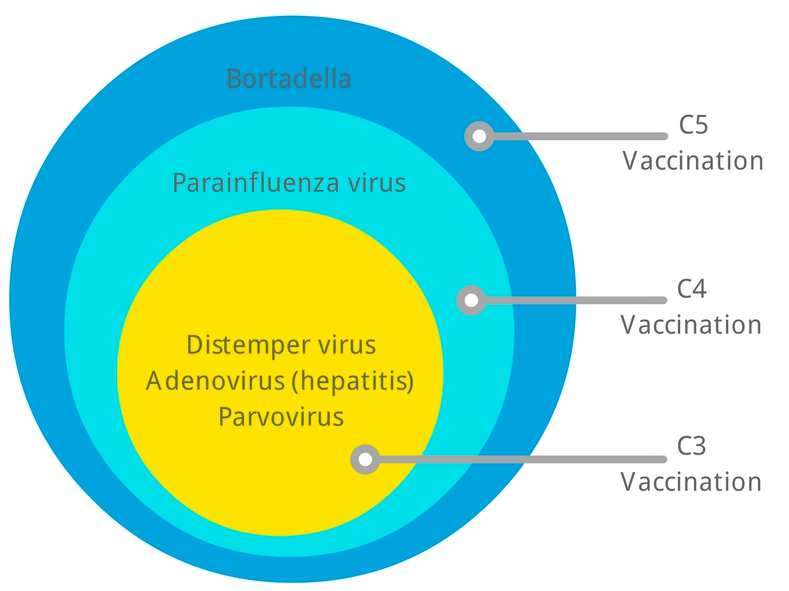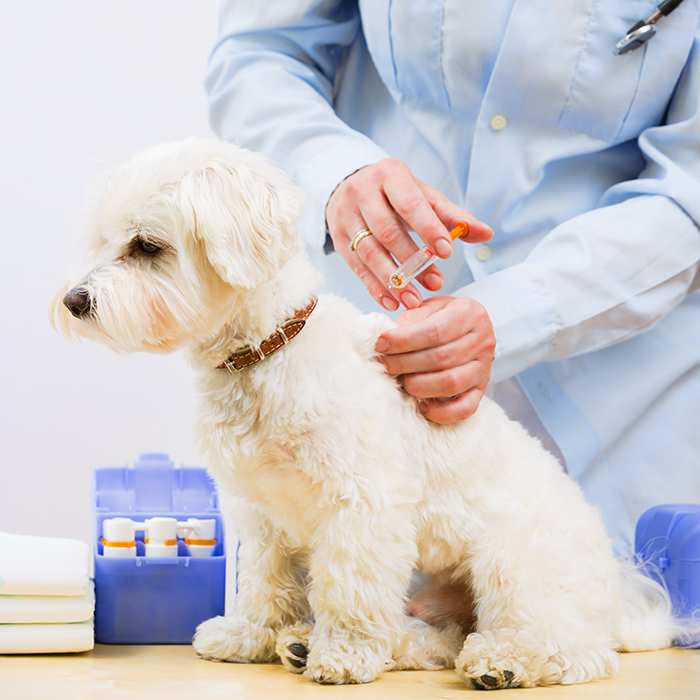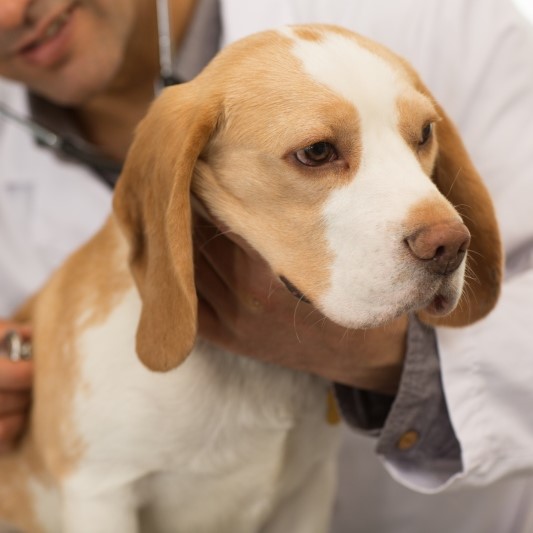C3, C5 and C7 dog and puppy vaccination costs
Dog vaccination costs can vary considerably, however the following prices are indicative:
- C3 vaccination costs around $100 to $150
- C5 is around S100 to $150 and C7 is approximately $200 (prices as per August 2021).
- Prices can vary greatly between locations, so always check with your local clinic for specific charges.
Vaccination schedules for puppies and dogs
The following dog vaccination schedule is recommended by the Australian Veterinary Association (AVA). However, your local vet will advise on the appropriate dog vaccination schedule for your individual dog.
Puppy vaccination schedule
- 1st puppy vaccination: C3 – at 6 to 8 weeks
- 2nd puppy vaccination: C5 – at 12 weeks
- 3rd puppy vaccination: C3 booster – at 16 weeks
(Note: some vaccines are registered for completion in puppies at 10 weeks, meaning a 3rd vaccination is not required. However, your vet will guide you through the process.)
- 1st annual dog vaccination – at 15 months
Adult dog vaccination schedule
- Canine Cough vaccination – annually
- C3 vaccination – every 3 years
- Your vet may also recommend an annual C5 booster vaccination
Dog and puppy vaccinations explained
Your dog will be protected from a number of very serious diseases by having the recommended puppy and dog vaccinations. Below we discuss some of the more prevalent diseases and how vaccinations help prevent them.
Canine Distemper
What is Canine Distemper?
Canine Distemper is a viral infection that affects the brain, the spinal cord and the respiratory tract. Around 50% of infected animals die from the virus.
Canine Distemper is an airborne disease that is transmitted by an infected dog or wild animal through sneezing or coughing. Sharing of dishes and equipment can also result in transmission. An infected dog can shed the virus for months. The virus can also be passed on through the placenta of the mother dog to her puppies.
Canine Distemper Symptoms
Early signs of Canine Distemper include:
- Reddened eyes
- Watery discharge from nose and eyes
- High fever
Infected dogs become tired, lethargic and lose their appetite. Often vomiting, diarrhoea and coughing will also occur.
The condition can also cause serious symptoms, including convulsions, progressive paralysis and brain damage, and can lead to death.
Canine Distemper Prevention
Vaccinating your dog against Canine distemper will help to prevent the infection and spread of this disease. Keep your dog away from any infected animals and wildlife.
Fortunately, because of the availability of highly effective vaccines, Canine distemper is no longer as common as it used to be.
Canine Distemper Treatment
There is no specific treatment for this virus. Provide supportive care for the treatment of any symptoms and to prevent any secondary infections.
Read more about Canine Distemper here
Bow Wow Meow Pet Insurance can help protect you and your dog should an unexpected trip to the vet occur.
Get a quote
Parvovirus
What is Parvovirus?
The Parvovirus is highly contagious and is usually spread through contact with contaminated faeces or soil. Examples of potentially contaminated areas are parks, nature strips, kennels and show grounds. Direct contact with an infected dog is not required to spread the disease.
The parvovirus is one of the most resilient viruses. It can survive in the environment for 12 months or more and can only be killed with hospital grade disinfectant.
This virus has a very high mortality rate and most dogs will succumb to the infection within a matter of days.
Parvovirus is a potentially life threatening illness. If your dog needs to be hospitalised and treated for Parvovirus, costs can easily exceed thousands of dollars. Getting your puppy vaccinated will not just save money, it could also save your pup’s life.
Parvovirus Symptoms
The parvovirus acts very quickly and symptoms often develop within a matter of hours from the time of infection. Symptoms include:
- Excessive vomiting
- Diarrhoea containing blood
- Severe abdominal pain
- High fever
Parvovirus Prevention
Vaccinating your dog will help to prevent the infection and spread of the disease. If you are concerned that parvovirus may have contaminated a particular environment, it is best to carry your dog (using a handbag, stroller etc.) whilst in that environment.
Parvovirus Treatment
The likelihood of survival is determined by how quickly your dog receives medical treatment. Generally, treatment involves several days of intensive care at a veterinary hospital.
Read more about canine Parvovirus here
Infectious Hepatitis (Canine Adenovirus)
What is Infectious Hepatitis?
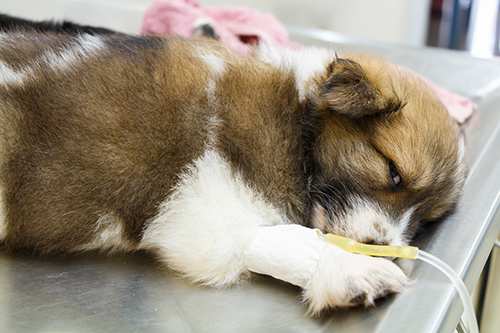
Infectious hepatitis is a highly contagious disease that is caused by the canine adenovirus. The primary means of catching the virus is through direct contact with an infected dog via bodily fluids such as nasal discharge and urine. Additionally, sharing cages, runs, bowls, toys and even human clothes and boots can lead to transmission.
The virus is so infectious that even dogs who have recovered from the disease may still pass on the virus for up to 6 months after their recovery. It is most dangerous to young dogs and is often fatal in puppies. Infectious hepatitis can be fatal within 36 hours.
Infectious Hepatitis Symptoms
The virus causes some serious symptoms including:
- Fever
- Diarrhoea
- Severe pain (due to inflammation of the liver)
- Abdominal infection
- Depression
- Coughing
- A notable loss of appetite
- You may observe a “blue eye”, which is a corneal opacity
Infectious Hepatitis Prevention
Vaccinating your dog will help in preventing the infection and spread of this disease.
Infectious Hepatitis Treatment
There is no specific treatment for this virus. Symptoms can be treated by administering intravenous fluids and providing supportive care.
Kennel Cough
What is Kennel Cough?
Kennel Cough or infectious tracheobronchitis is a common infection mainly caused by two bacteria which target the animal’s respiratory system: bordetella bronchiseptica and the parainfluenza virus.
Kennel Cough is highly contagious and usually spreads where dogs socialise, for example, parks, dog shows, dog training classes and kennels. Kennel Cough is so named because kennelled dogs are particularly susceptible to the disease, being confined in enclosed areas like boarding kennels and pounds together with other dogs.
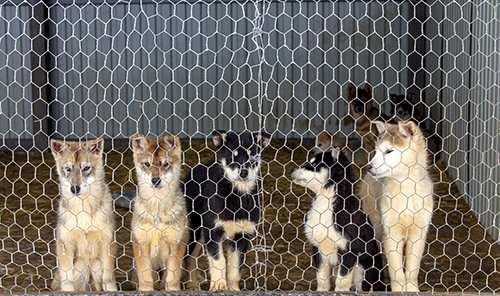
Kennel cough is transmitted through airborne droplets that are produced by sneezing and coughing. It is spread by direct contact between the animals and also by contact with contaminated surfaces including human hands and clothes.
Most dogs recover from Kennel cough within 3 weeks, however, this is dependant on their overall health. In older dogs, recovery can take up to 6 weeks. Kennel Cough can lead to pneumonia, which is a serious condition, so consult your vet immediately if your dog doesn’t improve within the expected time frame.
Kennel Cough Symptoms
The most common sign of Kennel Cough is a harsh, hacking cough that often finishes with gagging. Exercise, pressure on the throat (like pulling on the leash when wearing a collar) and excitement tend to make it worse.
Severe cases can exhibit fever, lethargy and a reduced appetite.
If your dog shows any of the following symptoms, it may indicate a more serious condition so it is very important to contact your vet right away:
- Rapid breathing
- Loss of appetite
- Listlessness
Kennel Cough Prevention
Adhering to the recommended dog vaccination schedule will help prevent the infection and spread of this disease.
Keep in mind that vaccinating your dog will help prevent infection with the two major organisms, but Kennel cough can also be caused by many other bacteria and viruses. There is still a chance your vaccinated dog may catch some other virus that causes Kennel Cough.
Kennel Cough Treatment
Most cases of Kennel Cough will resolve without treatment. Your vet may recommend antibiotics and cough medicines to help to alleviate the symptoms. If possible, ensure that your home is well humidified. It is advisable to use a harness instead of a collar until your dog recovers.
Read more about Kennel Cough here
Canine Leptospirosis
What is Canine Leptospirosis?
The Leptospira bacteria can be found in soil and water and are very prevalent in areas with a warm climate, high annual rainfall and swampy conditions.

Dogs can catch Canine Leptospirosis if they drink water contaminated with urine from infected animals (including mice, rats and even native marsupials). According to the American Veterinary Medical Association (AVMA), common risk factors include:
- Drinking from rivers, lakes or streams
- Roaming on rural properties (because of exposure to potentially infected wildlife, farm animals, or water sources)
- Exposure to wild animal or farm animal species, even if in the backyard
- Contact with rodents or other dogs
To become infected with the Leptospira bacteria, all it takes is for the dog’s mucous membranes (or skin with any wound, such as a cut or scrape) to come into contact with infected urine, urine-contaminated soil, water, food or bedding. The dog can also catch the bacteria if bitten by an infected animal or by eating infected tissues or carcasses. Whilst rare, it can be passed through the placenta from the mother dog to her puppies.
The disease is dramatic; it can cause kidney failure with or without liver failure and can result in death within a few days. Canine Leptospirosis can be passed on to humans. Avoid contact with your dog’s urine.
Canine Leptospirosis Symptoms
The signs usually start very suddenly, with symptoms including:
- Lethargy, reluctance to move
- Muscle tenderness
- Shivering
- Vomiting
- Diarrhoea
- Loss of appetite
- Increased thirst
- Changes of frequency and amount of urination
- It is usually associated with a fever
- Yellow gums are also common
Canine Leptospirosis Prevention
Vaccinate your dog if you live in a high-risk area (there have been cases reported in the area around Darwin, for example). Your local vet is the best person to advise whether you should vaccinate your dog.
Avoid any areas where your dog could come in contact with contaminated water, animals or any surfaces.
Canine Leptospirosis Treatment
Canine Leptospirosis is treated with antibiotics and supportive care. If treated early and aggressively, the chances of recovery are good; however, permanent damage to the liver or kidney can still occur.
Read more about Leptospirosis here
Canine Coronavirus
What is Canine Coronavirus?
The Canine Coronavirus is a highly contagious disease that is one of the predominant viral causes of diarrhoea in puppies. The virus primarily attacks the intestinal tract and it spreads via shedding in faeces of infected dogs. Once infected, the incubation time is generally between 1 to 4 days.
Adult dogs are often naturally immune, or develop a very mild, hardly noticeable, case of the disease. However, puppies less than 12 weeks old are at greatest risk, and weak ones in particular can die from this disease.
Canine Coronavirus Symptoms
The primary symptom is diarrhoea. The diarrhoea is similar to that of parvovirus but tends to be a bit milder. The only way to make sure it is not parvovirus is with a laboratory test.
Most puppies will recover from medium to severe diarrhoea after several days.
Unlike parvovirus, vomiting is not common.
Canine Coronavirus Prevention
Vaccination can protect your dog in areas where the Canine Coronavirus is prevalent. Susceptible environments such as breeding and grooming facilities, kennel housing and hospitals should be disinfected with commercial grade products.
Canine Coronavirus Treatment
While there is no specific treatment for Canine Coronavirus, supportive care is very important. The dog must stay well hydrated even if water must be force fed or fluids given intravenously.
And one more: Heartworm
 Heartworms are parasitic worms that are spread by mosquitos, and the resulting disease can be devastating. When the worms enter the dog’s body, they find their way to the heart and lungs where they grow and multiply until the organs become clogged and eventually fail.
Heartworms are parasitic worms that are spread by mosquitos, and the resulting disease can be devastating. When the worms enter the dog’s body, they find their way to the heart and lungs where they grow and multiply until the organs become clogged and eventually fail.
Heartworm prevention medication can be administered as an injection between the ages of 12 and 16 weeks, and thereafter with an annual booster. Additionally, preventative medication can be administered as a tablet which is typically given monthly or bi-monthly.
Read more about Heartworm here
Understanding pet vaccination: Overvaccination concerns and the role of Titre Testing
Increasingly over the last decade there has been debate concerning the over-vaccination of pets. One of the reasons for this is, depending on the vaccine used and the individual animal, immunity against a particular disease can last significantly longer than 12 months. Some pet owners are concerned about re-vaccinating their pet whilst its immunisation is still sufficient.
If you are concerned about this, and would like to know if your dog’s immunisation levels are still sufficient, an antibody titre test may be worth considering. In this process, a small amount of blood is taken from your pet and a laboratory test is used to determine the level of antibodies he still has in his body.
Titre testing will test the antibodies for the 3 core diseases of dogs:
- Infectious Hepatitis (ICH)
- Parvovirus (CPV)
- Distemper (CDV)
Your vet will then be able to recommend if your dog should be re-vaccinated or not.
Protecting your pet: Vaccination costs and Pet Insurance options

While immunisation may be costly, it is an essential part of ensuring that your dog lives a happy and healthy life. While pet insurance typically doesn’t cover vaccinations, Bow Wow Meow gives you the option to add on Routine Care (non-insurance benefit), which provides a contribution towards everyday items such as vaccinations and health checks.
Dog and Puppy Vaccinations in Australia: Questions and Answers
Vaccinating your dog is one of the most important things you can do to protect them from serious diseases. However, it’s natural to have questions about the process, potential side effects, and alternative options.
Here are some common questions and answers about puppy and dog vaccinations in Australia, with a focus on facts and details:
1. Are there any side effects of vaccinations for dogs?
Most dogs experience only mild and short-lived side effects from vaccinations, such as:
- Pain and swelling at the injection site: This is the most common side effect and usually resolves within a day or two. You can apply a cold compress to the area to help reduce swelling.
- Lethargy or mild fever: Your dog may seem tired or less active than usual after vaccination. This is typically temporary and resolves within a day or two.
- Loss of appetite: Some dogs may experience a temporary loss of appetite after vaccination. This is usually not a cause for concern unless it persists for more than a day or two.
- Mild coughing or sneezing: This can occur after intranasal vaccines, which are administered through the nose. It usually resolves within a few days.
Less common side effects include vomiting, diarrhoea, facial swelling, and hives. These may require veterinary attention. In rare cases, serious side effects like anaphylaxis (severe allergic reaction) or immune-mediated reactions can occur. These require immediate veterinary intervention.
Some breeds, such as toy breeds and brachycephalic breeds, may be more prone to certain reactions. Puppies and senior dogs with weaker immune systems might also be more susceptible to side effects.
If your dog experiences any concerning symptoms after vaccination, contact your veterinarian immediately.
2. What are the risks of not vaccinating my dog in Australia?
There are still several serious diseases that can affect unvaccinated dogs, including:
- Parvovirus: This highly contagious and potentially fatal virus causes severe vomiting, diarrhea, and dehydration. Puppies are particularly vulnerable.
- Distemper: This multi-systemic viral disease affects the respiratory, gastrointestinal, and nervous systems, often leading to death.
- Canine hepatitis: This virus can cause liver damage and death, especially in puppies.
- Kennel cough: This highly contagious respiratory infection causes coughing and can lead to pneumonia.
Even if your dog doesn’t come into contact with other dogs often, they can still be at risk of contracting these diseases from the environment or from wildlife. For example, parvovirus can survive in the soil for a long time.
3. How can I tell if my dog is having a reaction to a vaccine?
If your dog experiences any of the following symptoms after vaccination, seek immediate veterinary attention:
- Severe swelling at the injection site
- Difficulty breathing, coughing, wheezing
- Pale gums, weakness, collapse
- Vomiting, diarrhoea
- Hives, facial swelling
- Seizures
Reactions can occur within minutes to hours after vaccination, but some may take days to manifest.
4. Are there any alternative vaccination schedules in Australia?
Some veterinarians may recommend alternative vaccination schedules based on your dog’s individual needs and risk factors. For example, some vaccines may be given less frequently if your dog has a low risk of exposure to the disease.
Two main alternative approaches are:
- Minimal vaccination protocols: Only core vaccines are given, and boosters are spaced further apart. This approach is based on the idea that some vaccines provide immunity for longer than the traditional booster schedule suggests.
- Titer testing: This blood test measures the level of antibodies in your dog’s blood to determine if they are still protected against specific diseases. This can help you and your veterinarian decide if revaccination is necessary. However, the cost of titre testing can often be higher than vaccinating.
It’s important to discuss your dog’s vaccination schedule with your veterinarian to determine the best approach.
Bow Wow Meow Pet Insurance can help protect you and your dog should an unexpected trip to the vet occur.


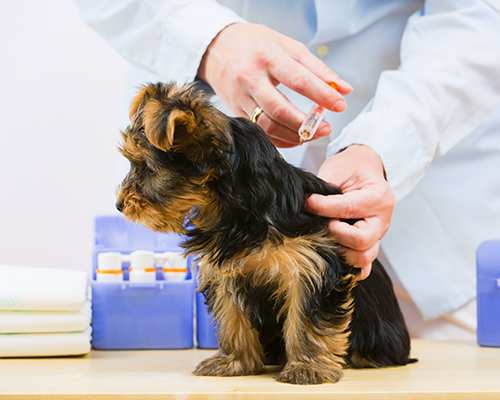
 Many serious canine diseases are preventable by following a vet-recommended puppy vaccination schedule in the initial stages, followed by an adult dog vaccination schedule for boosters required throughout life. Diseases that are preventable with dog vaccinations include Canine Hepatitis, Canine Distemper, Canine Parainfluenza and Canine Parvovirus. Some of these illnesses can potentially cause very serious health problems, discomfort or pain for your dog. Some can be so serious that they result in death within a number of days, or possibly even hours. This article gives you all the information necessary to understand why dog vaccinations are an essential element of your dog’s health and longevity.
Many serious canine diseases are preventable by following a vet-recommended puppy vaccination schedule in the initial stages, followed by an adult dog vaccination schedule for boosters required throughout life. Diseases that are preventable with dog vaccinations include Canine Hepatitis, Canine Distemper, Canine Parainfluenza and Canine Parvovirus. Some of these illnesses can potentially cause very serious health problems, discomfort or pain for your dog. Some can be so serious that they result in death within a number of days, or possibly even hours. This article gives you all the information necessary to understand why dog vaccinations are an essential element of your dog’s health and longevity. Dog immunisation is a fairly simple task to get organised. All veterinarians have the training and the equipment to quickly and easily vaccinate your pets against many of the biggest threats to their health.
Dog immunisation is a fairly simple task to get organised. All veterinarians have the training and the equipment to quickly and easily vaccinate your pets against many of the biggest threats to their health.